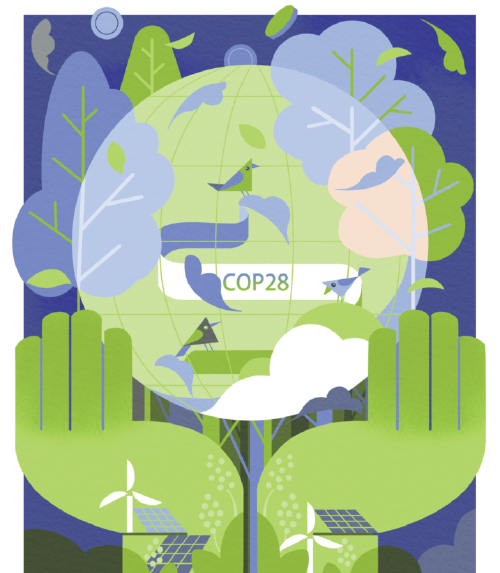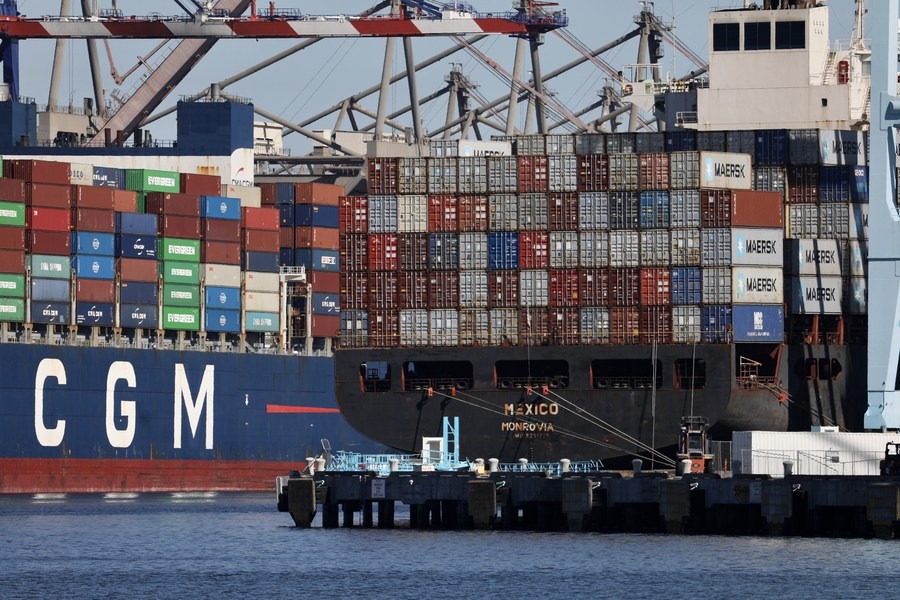No time to waste


LI MIN/CHINA DAILY
Businesses and philanthropic organizations must be included as key actors in the acceleration of climate action
More than 70,000 individuals from around the world will converge on Dubai, the United Arab Emirates, to participate in the 28th session of the Conference of the Parties to the United Nations Framework Convention on Climate Change (COP28) being held from Nov 30 to Dec 12. In the lead-up to the conference, the UAE has made no secret of its ambition to make this the most inclusive and consequential COP ever. And while much of that effort has rightly focused on elevating the voices of historically underrepresented communities, it has also sought to transform the manner in which the COP process engages with the private sector.
Most notably, COP28 will feature the inaugural Business & Philanthropy Climate Forum on Dec 1 and 2, held in parallel with the World Climate Action Summit. The forum will bring together 1,000 leaders from the business and philanthropic sectors all over the world — alongside policymakers and other stakeholders — to exchange ideas, co-create solutions and spur tangible action to support the climate agenda.
There are abundant opportunities for business and philanthropy actors to meaningfully participate in climate actions. In fact, COP28 and the Business & Philanthropy Climate Forum have developed a set of 22 potential actions that CEOs and philanthropists could take right away, ranging from supporting game-changing climate "moonshots" and breakthrough technologies, to accelerating the transformation of food supply chains across the Global South. The options are diverse and are aligned with immediate climate and nature-related needs and opportunities. Most importantly, they provide an accessible way for leaders to move beyond pledges and declarations and into action and implementation, in ways that are suited to their capabilities and competencies.
The forum's agenda is aligned with the four pillars outlined by the COP28 presidency, including fast-tracking the global energy transition, transforming climate finance, putting nature and people at the heart of climate action, and delivering the most inclusive COP ever. Some of the key areas that will be fleshed out over 100 sessions over the two days, include accelerating the transfer of technology, de-risking green investments, enhancing natural capital, boosting green small and medium-sized enterprises and startups, and increasing investment in resilience for vulnerable communities around the world.
Importantly, the outcomes are intended to extend far beyond COP28 itself. To that end, the COP28 Business& Philanthropy Forum has established global delivery partnerships with organizations as geographically and functionally diverse as the Sustainable Markets Initiative, International Finance Corporation, Organization for Economic Cooperation and Development, World Economic Forum, Asian Development Bank, Africa Finance Corporation, Inter-American Development Bank, Bill & Melinda Gates Foundation and XPRIZE.
Arguably, one of the most substantial impacts that business and philanthropy stakeholders could make is to help ramp up climate finance. It is estimated that global investments of over $3 trillion per year will be required to enable the world to achieve net zero emissions by 2050. Under the right conditions, the private sector could play a pivotal role in generating the multiplier effect required to take us from billions to trillions and meet that shortfall.
There are massively rewarding opportunities in rapidly growing markets such as China. China is set to double its renewable energy capacity and produce 1,200 gigawatts of energy through wind and solar power by 2025, reaching its 2030 goal five years ahead of time. China currently produces 650 terawatt-hours of wind power, nearly double that produced by the United States, and it contributes one-third of the world's solar power at 330 terawatt-hours, over twice the US' output. The rapid development and deployment of new energy vehicles in the country is another prime example of an industry accelerating the transition to green energy, against the backdrop of the government's pledge to hit peak carbon dioxide emissions before 2030 and to reach carbon neutrality by 2060. All of these developments underscore the possibilities and real actions businesses are already taking to spearhead tangible and substantial climate action.
For far too long, business and philanthropy have been on the periphery of global climate discussions, often dismissed as a part of the problem. Some may have been okay with that, as it helped them avoid the thorny politics and, in some cases, even thornier choices involved in addressing the climate crisis, but even those that did want to engage with the process in a constructive way could not always find a way in.
This has been a terrible missed opportunity. Private capital markets have more than doubled over the past decade, reaching over $23 trillion. Philanthropic capital alone flowing through the global financial system every single year is well above $1 trillion. By its nature, philanthropic capital can often be deployed in more flexible, risk-tolerant and patient ways than other forms of finance. Combined, these private capital flows are the key to unlocking accessible, affordable and targeted solutions to close the climate finance gap.
Nor should we neglect the massive additional contributions that businesses everywhere and of all sizes can make to the climate action agenda through their networks, capacity to innovate, and engagement with local communities. We know that businesses across the globe, including those in China, have played an essential role in driving climate action forward, working in tandem with their respective governments and communities.
In the same way that we can no longer decouple the human development agenda from the climate and nature agenda, we can also no longer afford to keep governments, businesses and philanthropists operating in isolation from one another. They must work together and in parallel, collaborating where they can while always playing to their respective strengths. When we get this right, blending capabilities and capital from across these different sectors, we can produce outcomes on a required scale and time frame that not one of these individual stakeholder groups could achieve on its own.
Governments at all levels will always have a leading role to play in steering local and global responses to climate change, but there is increasing evidence that the private sector also holds great untapped potential for accelerating the implementation of the world's climate and nature goals. Through initiatives such as the COP28 Business &Philanthropy Forum, we can engage with this essential community and others in new and constructive ways, in turn creating a more inclusive green agenda that meets our climate and nature goals, while being conducive to social and economic progress in a way that leaves no one behind.
The author is the COP28 special representative for Business & Philanthropy and CEO of UAE-based Crescent Enterprises. The author contributed this article to China Watch, a think tank powered by China Daily. The views do not necessarily reflect those of China Daily.
Contact the editor at editor@chinawatch.cn

































